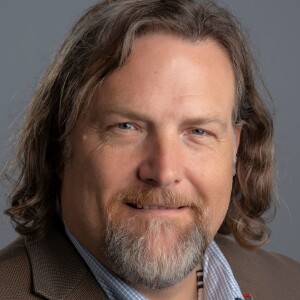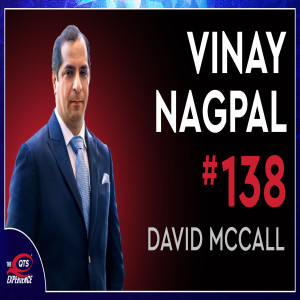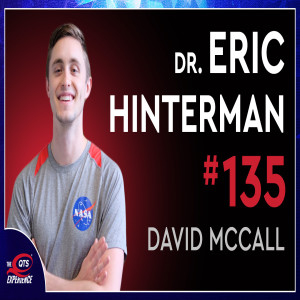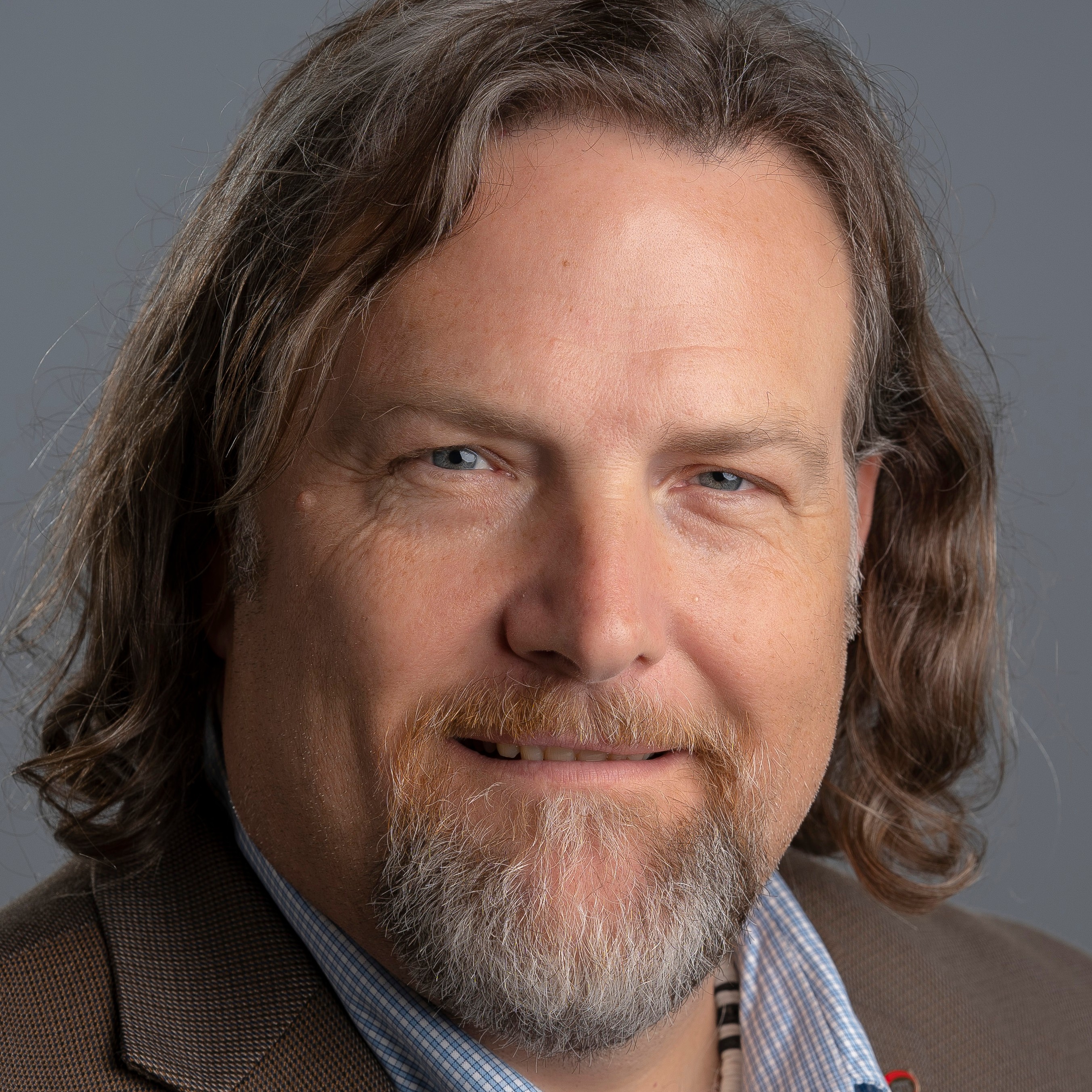Episodes

Wednesday Jan 04, 2023
James Cage; Episode 147
Wednesday Jan 04, 2023
Wednesday Jan 04, 2023
There are deep learning tools that are available to us today that have the power of magic. I can create a photorealistic image of an orangutan cowboy riding a glass lizard, just by using the power of language. I can speak something into existence, and most times you can't tell that a machine created it. That's pretty cool. Now, I don't know how valuable that picture would be, but the potential of the technology is incredible. That doesn't just happen in the world of fantasy and images, but in the world of poetry, creative writing, and who knows where else it will go. And that begs the question where is the line between machine and human reality and imagination? If we thought robots were going to disrupt the marketplace and perhaps take jobs, what's the consequence of the Internet getting involved? Well, I invited my friend James Cage to join us today. James studied data science and engineering from Georgia Tech University and has spent a career learning how to build and automate processes and tools. He regularly engages with these ideas in his new creative journey and has a fascinating story to tell and what it could mean to help human beings flourish. Join us for the conversation on this week's episode of the QTS Experience Podcast.
About Our Guest:
James Cage is a data science and artificial intelligence hobbyist who might be described as "a handsome man in his 50s, f2.8, realistic, friendly, intelligent". At least, that was the prompt used by DALL-E, the image generation AI system, to create his headshot. In his former life, he was an industrial control and marketing specialist.
The attached headshot is photorealistic and completely accurate.
Image Attribution: "James Cage and DALL-E"

Wednesday Dec 21, 2022
IEIC NAP Event; Episode146
Wednesday Dec 21, 2022
Wednesday Dec 21, 2022
This week I'm joined by several guests Scott Brown, Hunter Newby, Nigel Bayliff, and Anthony Romanello. Each of these men have had a role to play in the long history of building the Internet. The tools that we use and the future economic development of data centers and subsea cable landing stations. These are quick but important conversations. So join us for the discussion on this week's episode of The QTS Experience Podcast.

Wednesday Dec 07, 2022
Adam Knobloch; Episode 144
Wednesday Dec 07, 2022
Wednesday Dec 07, 2022
You and I generate or manipulate data every ten minutes – that’s at least 96 times a day. And the movie, spreadsheet, TikTok, Tele-med, or whatever we interact with – lives in someone’s data center. That makes datacenters the most important part of your world that you never knew existed. Which is why I invited my good friend Adam Knobloch to come help us understand more of this hidden world. Join us for a great conversation – on the next QTS Experience.

Wednesday Nov 30, 2022
Dr. Anna Erickson; Episode 143
Wednesday Nov 30, 2022
Wednesday Nov 30, 2022
One of the most important conversations we can be having today is energy. What type should we use? Its impact on the environment, the economy, its impact on politics, on our independence, and nuclear energy sits right in the middle of that discussion. Fair or unfair, it generates the most controversy.
But should it? Silicon Valley is betting on the future of nuclear energy. Our entire naval fleet runs on nuclear energy. NASA has even sent probes to space with nuclear energy. So with that in mind, I invited Dr. Anna Erickson to come and help us to understand what the conversation is about. Anna is the Associate Chair for Research and a Woodruff Professor at Georgia Tech.
She received both her M.S. and Ph.D. from M.I.T. and has spent her entire adult life in the heart of this discussion. It's an important and compelling conversation. So join me as I host Dr. Anna Erickson, as we discuss the potential and the risks of one of the most controversial discussions you can have today, nuclear energy.
About Our Guest
Anna Erickson is a Woodruff Professor at the Georgia Institute of Technology and group leader focused on creating and navigating projects in advanced nuclear reactor design, nuclear security, data analysis and machine learning. She is also the Director of the Consortium for Enabling Technologies and Innovation and a member of the Board of Directors for the American Nuclear Society. She is a strategy leader for problem formulation and execution and is an effective communicator at international conferences and invited seminars.

Wednesday Nov 23, 2022
Phillip Koblence & Nabeel Mahmood; Episode 142
Wednesday Nov 23, 2022
Wednesday Nov 23, 2022
Fake News, AI, Data Centers .... My conversation this week is with the original Digital nomads Nabeel Mahmood and Phil Koblence, the founders of The Nomad Futurist Foundation and Podcast. In this quick conversation we discuss how the coding within the U.S. Emergency alert system may have tremendous flaws, the emerging AI within Fintech, and the good work The Nomad Futurist Foundation is attempting to accomplish. Please, enjoy the conversation – on this week's episode of The QTS Experience Podcast.
About Our Guests
Phillip Koblence
Phillip Koblence co-founded NYI (www.nyi.net) in 1996. Since then, he has successfully navigated through an ever-shifting infrastructure landscape and grown the company from a single data center in Lower Manhattan to a robust network with executional capabilities in key national and international markets. His leadership over a span of more than twenty years has positioned NYI as a leader in hybrid infrastructure solutions. Part of NYI’s success is due to the strong emphasis placed on building lasting relationships with clients. Through this focus on customer experience, and an ability to cut through complexity and hype, NYI has set the bar in the industry for high-touch infrastructure solutions. Phillip is a frequent speaker at industry events and has been profiled by Data Center Knowledge, TheWHIR, MSPMentor, and NJ BIZ. He has also contributed to CRN and NJ Business Magazine. He is a graduate of the University of Pennsylvania, with an engineering degree.
Nabeel Mahmood
Nabeel Mahmood is a Technologist, Futurist, and a Keynote Speaker. His career is driven by one question – what’s next? He is passionate about the power of technology to deliver competitive and transformational change and the need to develop digital leadership that will create the enterprise of the future. He believes strongly in simplification, with a purpose.
Nabeel brings 20 plus years of experience leading large-scale global technology organizations through seasons of explosive growth via M&A, global expansion, implementing new business models, and technology innovation. His expertise include leading organizations through transformation changes, connecting IT to the needs of the business, technology innovation, Big Data, Cloud, ERP, IoT, AI, ML, RPA, Mobility, and Data Centers. He brings a unique blend of experiences spanning the entire breadth of technology from Grid to Chip. At heart he’s a true technologist and futurist, he is a proven strategist, winsome communicator, and leader with extraordinary vision and operational expertise within large, complex organizations.
Nabeel is a strategic CXO identifying opportunities that are being underpinned by emerging technologies and is an advisor to CIO’s, CTO’s and CEO’s across a number of industries. He servers on multiple boards of private and publicly traded companies, including United Security Bank.

Wednesday Nov 16, 2022
Dr. Sergey Plis; Epsiode 141
Wednesday Nov 16, 2022
Wednesday Nov 16, 2022
It's impossible to have a conversation about A.I. or machine learning without also talking about neural networks. The thing is, most of us think we know what it is, and some of us have an opinion on what machine learning is. But very few people actually know what a neural network is; why it matters? Do these networks evolve like the human brain? What are the ethical implications of building an infrastructure like that? Are they secure? My conversation today is with Sergey Plis, a professor of computer science at Georgia State University and the director of Machine Learning at the Center for Translational Research in Neuro Imaging and Data Science (TReNDS). He and his collaborators received funding recently from the NSF and the New Age to study casual connections in the brain. Obviously, Sergey likes to keep things busy. Please enjoy this incredible and fascinating conversation on this week's episode of The QTS Experience Podcast.
About Our Guest
As an Associate Professor of Computer Science and a Director of Machine Learning at the Center for Translational Research in Neuroimaging & Data Science, I like to keep things busy. Probably for that reason, I have three kids, two cats and a dog. I travel often, moved a few times recently, and have painted rooms and houses everywhere I go.
My research focuses on developing computational instruments that enable knowledge extraction from observational multimodal data collected at different temporal and spatial scales. I believe we can provide the neuroimaging community with a more robust, reliable understanding of directed connectivity in the brain.
We can’t just poke around in living human brain to see how it works. I and my collaborators are honored to have received $1.3 million from the National Science Foundation and the National Institutes of Health (NIH), to study causal connections in the brain. Here are only a few of my other accomplishments:
- Published one of the first demonstrations of the versatile potential of deep learning methods for the field in 2013 and since then my group developed a number of deep learning approaches to neuroimaging.
- Developed the theories in complex time series including a number of algorithms creating a new subarea in causal research.
- Developed efficient algorithms for matrix factorization.
- Enabled research on federated datasets with a focus on preserving privacy, inspiring a project for creating a framework to enable research on decentralized data.

Wednesday Nov 02, 2022
Dr. Steven Beckwith; Episode 139
Wednesday Nov 02, 2022
Wednesday Nov 02, 2022
In my normal life, I talk about the edge, edge compute, edge networking, smart devices; you know, the edge. When Professor Steve Beckwith talks about the edge, he's considering the universe. Professor Beckwith joins me this week for an incredible conversation on how AI and machine learning through tools like the Web and Hubble telescopes are informing us about the universe and all the gory, catastrophic, beautiful and fascinating stories it has to tell us.
It informs the world we live in today, the potential impact of technology as it's evolving. Professor Beckwith should know. He is currently the director of the Space Sciences Laboratory at Berkeley and has previously served as the director of many other similar institutions here in the States and internationally, including as the Vice President for research and graduate studies for the ten campus University of California system.
About Our Guest
Steven Beckwith is a Professor of Astronomy at the University of California, Berkeley. His 40-year research career spans a many interests including the formation and early evolution of extra-solar planetary systems, the evolution of young stars, and the birth of galaxies in the early universe. In 2004, he led the team that created the Hubble Ultra Deep Field, the deepest visual image of the universe, resulting in the discovery of the most distant galaxies ever seen. He has published approximately 200 articles and won several international awards for his work. He lectures worldwide and advises organizations in the United States and Europe on research policy.
He received his BS in Engineering Physics from Cornell University and his Ph.D. in Physics from the California Institute of Technology. He returned to Cornell in 1978 as an Assistant Professor of Astronomy and stayed on the faculty for 13 years. In 1991, he moved to Germany as Director of the Max-Planck-Institut für Astronomie in Heidelberg, directing the institute's scientific program and the German National Observatory in Spain. He returned to the United States in 1998 as the Director of the Space Telescope Science Institute in Baltimore, Maryland, where he was responsible for the science operations of the Hubble Space Telescope. He became the telescope's leading public spokesman after NASA announced in 2004 that it would no longer service the telescope, successfully advocating for its continued operation (NASA reversed its decision in 2006). After stepping down as Director, he became a Professor of Physics and Astronomy at Johns Hopkins University and a Distinguished Research Scientist at the Space Telescope Science Institute. In 2008, he was appointed Vice President for Research and Graduate Studies at the University of California systemwide office and a Professor of Astronomy at Berkeley. In July 2014, he left the Office of the President to resume his research at UC Berkeley.

Wednesday Oct 26, 2022
Vinay Nagpal; Episode 138
Wednesday Oct 26, 2022
Wednesday Oct 26, 2022
The Internet is a network of networks. It's built across fiber, satellite, and subsea cables that span the globe. It seems really resilient; there isn't a single off switch. But you already knew that. What we don't talk much about is the infrastructure that supports it and to some degree, it's vulnerability. This week, I invited Vinay Nagpal to help us understand why internet infrastructure matters so much to us. Vinay is the President of InterGlobix, a data center and fiber consultancy group. He is also the Executive Director and Founding Member of the Internet Ecosystem Infrastructure Committee (IEIC). He's heavily involved in a wide range of industry boards and advisory roles. In other words, he really knows what he's talking about. So join us for a really cool conversation on this week's episode of The QTS Experience.
About Our Guest
Vinay Nagpal is a Data Center and Connectivity leader and visionary with over 27 years of experience developing products and technology solutions and business growth strategies for data centers with a strong focus on connectivity, subsea and terrestrial fiber. He is currently President of InterGlobix, a global consultancy and advisory firm focused on the convergence of data centers, subsea and terrestrial fiber.
He is the Founding Member and Executive Director of the IEIC (Industry Ecosystem Innovation Committee), which is actively leading the development of diverse, resilient Interconnection Ecosystems globally. Previously, Vinay held senior-level business transformation roles at Digital Realty, DuPont Fabros Technology, Tata Communications, Verizon, MCI, Digex, UUNET and Canada.com
Boards & Affiliations:
- Internet Ecosystem Innovation Committee (IEIC): Founding Member & Executive Director
- QTS Richmond NAP: Co-Founder & Member
- NVTC Data Center & Cloud Committee: Chairman of Leadership Board
- SubOptic: Member, Diversity & Inclusion Working Group
- PTC: Marketing & Communications Committee, Membership Committee
- LINX Northern Virginia: Customer Advisory Board
- NVTC Executive Circle

Wednesday Oct 19, 2022
Matteo Pietrobelli; Episode 137
Wednesday Oct 19, 2022
Wednesday Oct 19, 2022
I'm joined by Matteo Jean Pietrobelli, a structural and systems engineer at Oceanix. Today, he is helping to create a floating city in Busan, South Korea. In and of itself, an interesting topic, but to call Matteo an "engineer" is like calling Tom Hanks a "storytelling guy". Matteo is a master engineer and he has a wide range of experience in 3D printing, The Hyperloop, complex systems, and so much more. He truly is a Renaissance man, and since he's from Rome, he wears the title well. This episode, he and I are going to dive into the sciences, engineering, even the philosophies of these topics and more. I'm sure you'll find the conversation as interesting as I did. Please enjoy the conversation. And now the Matteo Pietrobelli on this week's episode of The QTS Experience.
About Our Guest
Highly driven Structural, Civil and Systems Engineer with a strong track record executing complex multi-billion dollar construction projects, spanning transportation, marine, and highrise (residential and commercial) structures. Led the design, engineering and integration of systems in high-speed train railway-line, multi-building complex and award winning bridge/infrastructure projects, Hyperloop Transportation Systems, and Floating cities and Infrastructures in Asia, Africa, Europe and USA. Experienced in integration of digital and physical infrastructures for the purpose of risk assessment and optimization of system resiliency and performance, such as Structural Health Monitoring Systems, he is able to seamlessly move between disciplines and solve problems related to structural and systems engineering.
I am passionate about exponential technologies and their potential to solve big global challenges.
3X founder of cutting-edge companies focused on concrete 3D printing and advanced structural modelling (Nomogram), and aeroponic and hydroponic fresh produce vertical farming (Agripublica). His skill-set includes R&D, taking products from research to commercialization, interfacing between clients and consultants/contractors developing and protecting IP assets. Proficient in manipulating geometries and wireframes, while utilizing commercial and advanced software.
Currently working as the Chief Engineer and CTO of Oceanix City, a cutting edge Climate/Blue Technologies development and integration company for floating infrastructures, he is leading the design and engineering of the physical and digital systems, with a specific trend towards the development of Smart Floating Cities and Infrastructures integrated through digital twins and Metaverse for multi-tiered environmental, Resilient and Sustainable development.
He has a global perspective and spent more than half of his life working and residing in different countries, including Switzerland, China, Algeria, Togo, Madagascar, Nigeria, India, France, Austria, Slovenia, Italy and USA.
He is fluent in Italian, French (native) and English and speaks a bit of Russian and Chinese.

Wednesday Oct 05, 2022
Dr. Eric Hinterman; Episode 135
Wednesday Oct 05, 2022
Wednesday Oct 05, 2022
I recently learned that we have a tool that converts carbon to oxygen. Think about that. It seems like every conversation around energy is also at some level about carbon. Dr. Eric Hinterman helped build and manage a tool called Moxie, which is a device that pulls carbon dioxide from the atmosphere and converts it to oxygen. Eric recently joined Space X and before that he was at MIT and Blue Origin and other places where smart people congregate. Moxie is intended to be used in space travel, in space colonization, where there is an abundance of carbon and little, if any, oxygen. Today, the power required to convert carbon dioxide to oxygen on earth would be counterproductive, to say the least. But we're on the path, and I'm optimistic that tools like this will lead to human flourishing. Please enjoy this conversation with Dr. Eric Hinterman on the next cuts experience.
About Our Guest
https://erichinterman.wixsite.com/eric
https://mars.nasa.gov/mars2020/spacec...
Eric Hinterman holds a PhD from MIT in Aeronautics and Astronautics and works with NASA on MOXIE, an instrument on the Perseverance rover that produces oxygen on Mars. He attended the University of Notre Dame for his undergraduate studies, where he received a degree in Chemical Engineering. After working in the chemical industry for several years, Eric returned to school to pursue graduate degrees in Aeronautics and Astronautics. He is passionate about human spaceflight and plans to spend his career pushing the boundaries to enable human exploration of Mars and beyond.

